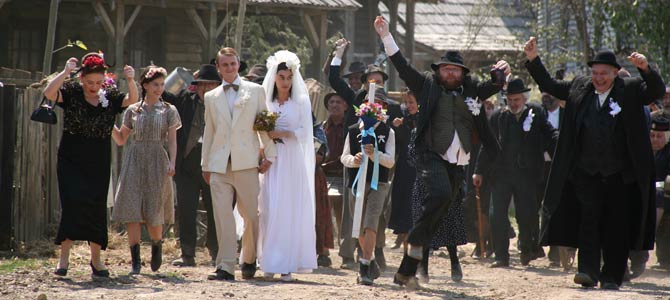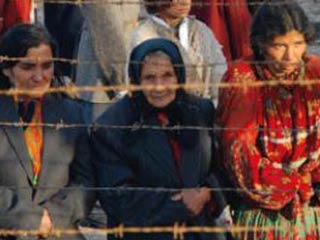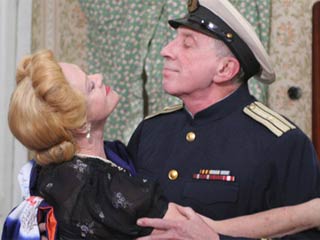The 33rd Montreal World Film Festival
by M. Faust

A Week Without Movie Stars
The enormous success of the Toronto Film Festival, which in the past 20 years has become the leading event of its type open to the public, has come at a cost to other film festivals that take place during the same time of year. The New York Film Festival, once a major event in the arthouse world, is now of importance only to trend-watchers on the island of Manhattan.
More of a loss by far is the effect on the Montreal World Film Festival, which precedes Toronto by a week and which I have been attending since 1995. For years the two ran neck and neck, competing to premiere films from the same pool of foreign and independent releases. Through the 1990s, that was a big enough pool for both festivals to thrive. But as Toronto secured and strengthened its position by bringing in more big Hollywood pictures (and their audience-friendly stars), Montreal continued to rely on foreign films. And with fewer of those picked up for North American distribution every year, the pool of high-profile picks shrank steadily.
This is not to say that there aren’t plenty of worthwhile movies on display at the Montreal festival, which has just concluded. But it does mean that it’s hard to pick them out from the so-so movies that are inevitable in a selection of more than 200 features. The festival’s catalogue is unfortunately dry, with descriptions of the films largely limited to plot summaries that don’t even indicate if a film is a comedy or a drama. Few of the films have played elsewhere in the English-speaking world, so there’s little “buzz.” There were only a handful of films from name-value filmmakers (Theo Angelopoulos, Andrzej Wajda, Tony Gatlif, Benoît Jacquot), and about as many movie stars—of the two dozen or so films I watched, the only performers I recognized were Lainie Kazan, Carmen Electra, and Saul Rubinek in Oy Vey! My Son Is Gay!!, a farce that is almost as silly as its title.
With as many as 12 screens running at any given time (not even counting the free films shown outdoors), deciding what to see is a real problem. In the past I’ve tried to see as many of the films in official competition as possible, but that’s not the best way to go: Competitions always tend to attract movies with the broadest appeal to their base, and can be as dull as they are respectable. Probably the least rewarding two hours I spent in Montreal was watching Die Standesbeamtin (Will You Marry Us), from which I learned only that the Swiss can make romantic comedies as banal as those from anywhere else in the world.
Fortunately, I also saw some wonderful movies that I can only hope get picked up for distribution in North America, if not in theaters then at least for DVD or cable. Among them:


KORKORO (FREEDOM)—That this won the competition for Best Film was no surprise, as Montreal has always loved Tony Gatlif’s films about Europe’s Roma (Gypsies), including Latcho Drom and Gadjo Dilo. Korkoro is set against a historical backdrop that Gatlif was bound to tackle sooner or later, the attempts by the Nazis to exterminate all Gypsies. But while the film serves its purpose in reminding us that these nomadic people were also victims of the Nazis (who killed as many as 500,000 of them), it’s less a melodramatic history lesson than another of Gatlif’s typically musical cultural studies, in which an extended Rom family tries to settle down in a town in Vichy France after being warned about laws enacted to forbid their travelling lifestyle.
NUNTA MUTA (SILENT WEDDING)—Another film based on a recent historical tragedy, this Romanian movie contains one of the most memorable comic scenes I’ve ever shared with an audience. The story takes place in 1953 in a small village in Romania, past of but not yet wholly under the control of the Soviet Union. Like one of Emir Kusterica’s movies about boisterous Serbians (Underground, Black Cat White Cat), much of actor/director Horatiu Malaele’s film is spent casually observing the comical lifestyles of the locals, who are far more interested in alcohol, music and fornication than the threat of Soviet repression. A wedding would seem to be the perfect outlet for all of these interests, and the villagers is just about to rip into a big one when they are informed that due to the death of Stalin a policy of silence will be enforced for two weeks. Having made too many preparations for an elaborate feast, they instead decide to hold it indoors later that night. This extended sequence of a roomful of people trying to hold a perfectly silent celebration (including musicians miming playing their instruments) provoked patches of giggling in the theater that grew in intensity until the entire room was enveloped in a weird kind of muffled hysteria. It’s one of the most memorable filmgoing experiences I have ever had, spoiled somewhat by a 180 degree turn the movie takes at the height of the scene into tragedy.
MEIN KAMPF—Not to be confused with My Führer, the controversial 2007 comedy by German director Dani Levy (Go for Zucker) that has recently been playing in some American cities, this is another German film that paints what sounds like an uncomfortably flippant portrait of the notorious dictator. In the early 1900s, an aspiring artist shares a flophouse room with two older men who try to help him pass his entrance exam into the Vienna Academy of Fine Arts. The artist is a young Adolph Hitler, and his kindly, paternal friends are a pair of Jews with artistic aspirations of their own. Adapting a theater piece by George Tabori, director Urs Odermatt generally avoids slapstick to paint a black-comic burlesque, in which large doses of Jewish humor comment on a troubled personality’s trajectory into evil.
POLTORY KOMNATY ILI SENTIMENTALNOE PUTESHESTVIE NA RODINU (A ROOM AND A HALF)—The first live-action film by veteran Russian animator Andrey Khrzhanovsky, who is 69, packs a long lifetime’s worth of observations and memories into a delightfully playful exercise in imagination. Using the work of Russian-born poet Joseph Brodsky (who emigrated to the United States, where he was named poet laureate in 1991), Khrzhanovsky uses Brodsky’s life in the 1940s and 50s as a palate to remember the glories of Russian culture, tinged with sadness at their loss.
blog comments powered by Disqus|
Issue Navigation> Issue Index > v8n37 (week of Thursday, September 10, 2009) > The 33rd Montreal World Film Festival This Week's Issue • Artvoice Daily • Artvoice TV • Events Calendar • Classifieds |









 Current Issue
Current Issue